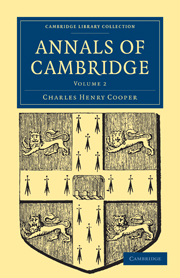ELIZABETH: Pages 546–619
Published online by Cambridge University Press: 05 October 2010
Summary
On the 12th of January, Peter Baro, D.D., the Lady Margaret's Professor of Divinity, preached ad clerum at Saint Mary's. His discourse had reference to the doctrines of the Lambeth articles, but “did not so much deny these propositions, as moderate them, and state as he apprehended, the true sense of them.” It gave great offence to the Calvinistical party, and on the following day the Vicechancellor wrote to Archbishop Whitgift, with a full account of it, adding, “that he did the same day privately and severally confer, first with Dr. Clayton, and then with Mr. Chaderton, (two of the Heads present at the sermon,) partly to understand what they thought of the same sermon. And he found them both to think as he did: to be much grieved; to marvel he durst revive such matters, considering former order taken; and to fear it would be occasion of disturbing the peace, well begun to be settled, and making again new stirs and divisions among them; unless some wise and effectual remedy might be in time provided. Which care in that place lying by office especially upon the Vice-Chancellor, he being perplexed, as he said, what course to take; not seeing by what statute Baro might be dealt withal, and wanting assistance of Heads of colleges, being so few then at home: he thought good first to acquaint his Grace herewith, and humbly to pray his wise aid and advice, being heartily sorry to trouble his Grace with such news.
- Type
- Chapter
- Information
- Annals of Cambridge , pp. 546 - 619Publisher: Cambridge University PressPrint publication year: 2009First published in: 1845



